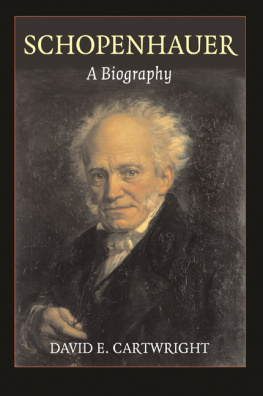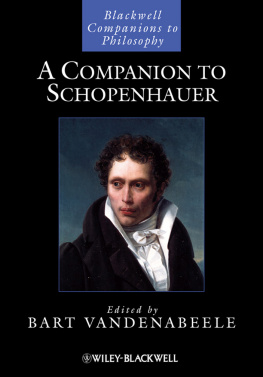Cartwright - Schopenhauer: a Biography
Here you can read online Cartwright - Schopenhauer: a Biography full text of the book (entire story) in english for free. Download pdf and epub, get meaning, cover and reviews about this ebook. City: Cambridge;Germany, year: 2010;2014, publisher: Cambridge University Press, genre: Non-fiction. Description of the work, (preface) as well as reviews are available. Best literature library LitArk.com created for fans of good reading and offers a wide selection of genres:
Romance novel
Science fiction
Adventure
Detective
Science
History
Home and family
Prose
Art
Politics
Computer
Non-fiction
Religion
Business
Children
Humor
Choose a favorite category and find really read worthwhile books. Enjoy immersion in the world of imagination, feel the emotions of the characters or learn something new for yourself, make an fascinating discovery.
- Book:Schopenhauer: a Biography
- Author:
- Publisher:Cambridge University Press
- Genre:
- Year:2010;2014
- City:Cambridge;Germany
- Rating:5 / 5
- Favourites:Add to favourites
- Your mark:
- 100
- 1
- 2
- 3
- 4
- 5
Schopenhauer: a Biography: summary, description and annotation
We offer to read an annotation, description, summary or preface (depends on what the author of the book "Schopenhauer: a Biography" wrote himself). If you haven't found the necessary information about the book — write in the comments, we will try to find it.
Schopenhauer: a Biography — read online for free the complete book (whole text) full work
Below is the text of the book, divided by pages. System saving the place of the last page read, allows you to conveniently read the book "Schopenhauer: a Biography" online for free, without having to search again every time where you left off. Put a bookmark, and you can go to the page where you finished reading at any time.
Font size:
Interval:
Bookmark:

Arthur Schopenhauer (17881860) was one of the most original and provocative thinkers of the nineteenth century. He spent a lifetime striving to understand the meaning of living in a world where suffering and death are ubiquitous. In his quest to solve the ever-disquieting riddle of existence, Schopenhauer explored almost every dimension of human existence, developing a darkly compelling worldview that found deep resonance in contemporary literature, music, philosophy, and psychology.
This is the first comprehensive biography of Schopenhauer written in English. Placing him in his historical and philosophical contexts, David E. Cartwright tells the story of Schopenhauer's life to convey the full range of his philosophy. He offers a fully documented portrait in which he explores Schopenhauer's fractured family life, his early formative influences, his critical loyalty to Kant, his personal interactions with Fichte and Goethe, his ambivalent relationship with Schelling, his contempt for Hegel, his struggle to make his philosophy known, and his reaction to his late-arriving fame. The Schopenhauer who emerges in this biography is the complex author of a philosophy that had a significant influence on figures as diverse as Samuel Beckett, Jorge Luis Borges, Emile Durkheim, Sigmund Freud, Thomas Hardy, Thomas Mann, Friedrich Nietzsche, and Ludwig Wittgenstein.
David E. Cartwright is professor of philosophy and religious studies at the University of Wisconsin Whitewater. He has published numerous articles on Schopenhauer and nineteenth-century German philosophy, translated and edited several of Schopenhauer's books, and is the author of the Historical Dictionary of Schopenhauer's Philosophy .

Was man in der Jugend wnscht, hat man im Alter die Flle.
Goethe, Dichtung und Wahrheit
Arthur Schopenhauer continues to be one of the most widely read philosophers outside of academe, and it is only a slight exaggeration to say that academics have paid him more attention in the last thirty years than they have in any period following the publication of his philosophical masterpiece, The World as Will and Representation , which appeared in December 1818. This remark, however, is not an exaggeration at all if it is restricted to Anglo-American scholars. Schopenhauer's broad popularity is relatively easy to understand, as is the resurgence of interest among scholars. In addition to addressing traditional topics in aesthetics, epistemology, ethics, logic, and metaphysics in the rigorous and specialized forms favored by philosophers, his fifty-year quest to discover and explain the meaning of the totality of experience led him to investigate almost every significant aspect of human experience. Ever the perennialist, he dealt with universal themes concerning the human condition, such as love, sex, suffering, death, the meaning and value of life, and redemption. He also explored phenomena neglected by many philosophers, including colors, genius, homosexuality, humor, madness, the metaphysics of music, the moral status of animals, mysticism, paranormal phenomena, and weeping. Always committed to the truth, he trailed its spurs wherever its track steered. Seldom worrying about writing to please, he stated the truth as he saw it. His voracious curiosity and cosmopolitan sensibilities made him the first major Western philosopher to seriously consider Eastern thought. In addition to his stressing commonalities between Eastern and Western perspectives, Hinduism and Buddhism helped shape his philosophy, and he recognized ways in which Eastern thought transcended that of the West.
Yet it is not simply his vast array of topics that draw readers to Schopenhauer. He loathed obscurantism of any kind, and he viewed the torturous styles of many of his contemporaries as displaying a poverty of thought that they attempted to conceal by incomprehensible jargon wrapped in ponderous sentence structures. Compared to his contemporaries and compared to most philosophers, he wrote wonderfully and clearly. He philosophized from the heart, from a genuine astonishment about the world, and not simply from a puzzlement about what other philosophers had said. He wrote with wit, irony, and sarcasm; polemically and provocatively; with grace and beauty. At times, reading Schopenhauer is an aesthetic experience of the first order. His works abound with personal observations based on his travels, his experiences of great works of art, and his keen attention to human behavior. He was as likely to quote from Goethe as he was from Kant. To illustrate a point, or to clarify an idea, he would draw from world literature and religion, from poetry and philosophy, and from the natural sciences.
Schopenhauer's original and darkly compelling worldview, with its expressive and inviting style and its emphasis on instinctive drives and nonrational forces directing not only human behavior, but everything in the world, has had a remarkable history of influence. Some scholars have detected the imprint of his thought in the work of figures as diverse as Jacob Burckhardt, Paul Deussen, Emile Durkheim, Albert Einstein, Sigmund Freud, Carl Jung, Erwin Schrdinger, Swami Viveknanda, and Wilhelm Wundt. Others have heard him in the music of Johannes Brahms, Antonn Dvork, Gustav Mahler, Arnold Schnberg, and Richard Wagner. Still others have read him in Charles Baudelaire, Samuel Beckett, Jorge Luis Borges, Joseph Conrad, Afanasij Fet, Gustav Flaubert, Theodor Fontane, Andr Gide, George Gissing, Thomas Hardy, Friedrich Hebbel, Hermann Hesse, Henrik Ibsen, Thomas Mann, William Somerset Maugham, Guy de Maupassant, Herman Melville, Edgar Allan Poe, Marcel Proust, Wilhelm Raabe, August Strindberg, Leo Tolstoy, Ivan Turgenev, Virginia Woolf, and Emile Zola. Moreover, there are those who have noted his mark on the philosophies of Henri Bergson, Eduard von Hartmann, Max Horkheimer, Friedrich Nietzsche, Ludwig Marcuse, Max Scheller, Richard Taylor, Hans Vaihinger, and Ludwig Wittgenstein.
Font size:
Interval:
Bookmark:
Similar books «Schopenhauer: a Biography»
Look at similar books to Schopenhauer: a Biography. We have selected literature similar in name and meaning in the hope of providing readers with more options to find new, interesting, not yet read works.
Discussion, reviews of the book Schopenhauer: a Biography and just readers' own opinions. Leave your comments, write what you think about the work, its meaning or the main characters. Specify what exactly you liked and what you didn't like, and why you think so.
















